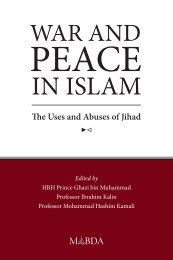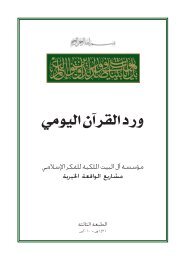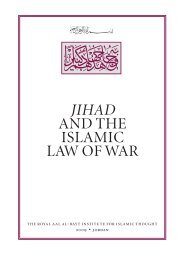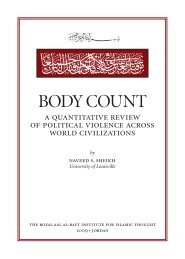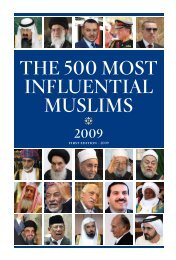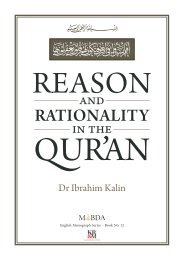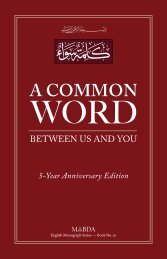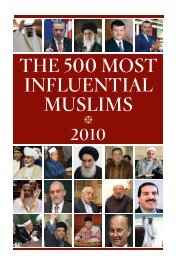Al-W¥^idÏ's Asb¥b al-Nuz‰l - The Royal Islamic Strategic Studies ...
Al-W¥^idÏ's Asb¥b al-Nuz‰l - The Royal Islamic Strategic Studies ...
Al-W¥^idÏ's Asb¥b al-Nuz‰l - The Royal Islamic Strategic Studies ...
You also want an ePaper? Increase the reach of your titles
YUMPU automatically turns print PDFs into web optimized ePapers that Google loves.
Chapter 24: Surah <strong>al</strong>-Nur<br />
<strong>The</strong> commentators of the Qur’an said: “This verse was reve<strong>al</strong>ed about Mu‘adhah and Musaykah, two<br />
slave-girls of ‘Abd <strong>Al</strong>lah ibn Ubayy, whom he used to force to whoredom and tax them for it. This was a<br />
pre-<strong>Islamic</strong> practice; people used to drive their slave-girls to whoredom and take a certain amount of the<br />
money they made from it. Upon the advent of Islam, Mu‘adhah said to Musaykah: ‘This business of ours<br />
is one of two things: if it is good, we have done plenty of it; and if it is evil, it is high time that we leave it’.<br />
And so <strong>Al</strong>lah, ex<strong>al</strong>ted is He, reve<strong>al</strong>ed this verse”. 17<br />
Said Muqatil: “This verse was reve<strong>al</strong>ed about six slave-girls who were owned by ‘Abd <strong>Al</strong>lah ibn Ubayy.<br />
<strong>The</strong> latter forced them to whoredom in order to benefit from the money they earned from selling themselves.<br />
<strong>The</strong>se slave-girls were: Mu‘adhah, Musaykah, Umaymah, ‘Amrah, Arwa and Qutaylah. One day,<br />
one of them brought back with her one piece of gold while another one brought back with her a stripy<br />
garment. He said to them: ‘Go back and do more’. <strong>The</strong>y said: ‘By <strong>Al</strong>lah, we will not; <strong>Al</strong>lah has brought us<br />
Islam and made adultery forbidden’. <strong>The</strong>y went to the Messenger of <strong>Al</strong>lah, <strong>Al</strong>lah bless him and give him<br />
peace, and complained to him. And so, <strong>Al</strong>lah, ex<strong>al</strong>ted is He, reve<strong>al</strong>ed this verse”.<br />
<strong>Al</strong>-Hakim Abu ‘Amr Muhammad ibn ‘Abd <strong>al</strong>-‘Aziz informed us, through that which he wrote to me><br />
Ahmad ibn <strong>al</strong>-Fadl <strong>al</strong>-Haddadi> Muhammad ibn Yahya> Ishaq ibn Ibrahim> ‘Abd <strong>al</strong>-Razzaq> Ma‘mar><br />
<strong>al</strong>-Zuhri who related that a man from the Quraysh was taken prisoner at the Battle of Badr. He was the<br />
prisoner of ‘Abd <strong>Al</strong>lah ibn Ubayy. <strong>The</strong> latter had a slave-girl c<strong>al</strong>led Mu‘adhah. <strong>The</strong> Qurashite prisoner<br />
sought to tempt Mu‘adhah to sleep with him but she persistently refused because she was Muslim. Ibn<br />
Ubayy tried to force her to sleep with the Qurashite and hit her to make her comply. He was hoping that<br />
she would eventu<strong>al</strong>ly get pregnant from the Qurashite so that he could demand a ransom for his child.<br />
However, <strong>Al</strong>lah, ex<strong>al</strong>ted is He, said: (Force not your slave-girls to whoredom) up to His words (<strong>Al</strong>lah will<br />
be Forgiving, Merciful!), He says: I will forgive them that which they were forced to do. 18<br />
(And when they appe<strong>al</strong> unto <strong>Al</strong>lah and His messenger to judge between them…) [24:48].<br />
<strong>The</strong> commentators of the Qur’an said: “This verse and the verse after it were reve<strong>al</strong>ed about Bishr, the<br />
hypocrite, and his opponent, a Jewish person, regarding their dispute over a piece of land. <strong>The</strong> Jew kept<br />
dragging Bishr to the Messenger of <strong>Al</strong>lah, <strong>Al</strong>lah bless him and give him peace, in order that he judges<br />
between them while the hypocrite kept dragging the Jew to Ka‘b <strong>al</strong>-Ashraf, saying: ‘Muhammad will be<br />
unfair with us!’ ” This incident has <strong>al</strong>ready been mentioned upon de<strong>al</strong>ing with the words of <strong>Al</strong>lah (…<br />
how they would go for judgment (in their dispute) to f<strong>al</strong>se deities…) in Surah <strong>al</strong>-Nisa’ [4:60].<br />
(<strong>Al</strong>lah hath promised such of you as believe and do good work…) [24:55].<br />
<strong>Al</strong>-Rabi‘ ibn Anas related that Abu’l-‘<strong>Al</strong>iyah said regarding this verse: “<strong>The</strong> Messenger of <strong>Al</strong>lah, <strong>Al</strong>lah<br />
bless him and give him peace, and his Companions remained in Mecca, after the advent of the revelation,<br />
for ten years in a state of fear: sleeping at night and waking in the morning with weapons at their sides.<br />
<strong>The</strong>n the Prophet was commanded to migrate to Medina. One of his Companions asked him: ‘O Messenger<br />
of <strong>Al</strong>lah, there is not a single day in which we feel safe such that we can put down our weapons’.<br />
<strong>The</strong> Messenger of <strong>Al</strong>lah, <strong>Al</strong>lah bless him and give him peace, said: ‘It will not be long before one of you<br />
will be sitting unarmed amidst huge numbers of people, none of whom carries a weapon’. <strong>The</strong>n, <strong>Al</strong>lah,<br />
ex<strong>al</strong>ted is He, reve<strong>al</strong>ed (<strong>Al</strong>lah hath promised such of you as believe and do good work…) up to the end of<br />
the verse. Consequently, <strong>Al</strong>lah, ex<strong>al</strong>ted is He, enabled His Prophet, <strong>Al</strong>lah bless him and give him peace,<br />
to have the upper hand over the Arabian peninsula, and the Muslims were able to put down their weapons<br />
and feel safe. <strong>The</strong>y remained safe after <strong>Al</strong>lah, ex<strong>al</strong>ted is He, took to Himself His Prophet, and during<br />
the reign of Abu Bakr, ‘Umar and ‘Uthman, may <strong>Al</strong>lah be well pleased with them. When they fell into<br />
that which they fell and were ungrateful, <strong>Al</strong>lah brought fear into their hearts; they changed and so <strong>Al</strong>lah,<br />
17<br />
Durr, :194.<br />
18<br />
Tabari, :133; Durr, :193-194.<br />
169



